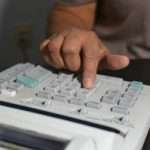
This post provides complete information on the job description of a bank teller, to increase your knowledge of what they do.
What Does a Bank Teller Do?
A bank teller is a bank employee who deals directly with most customers. In some countries, this employee is also known as a cashier.
The bank teller job description entails counting the cash in the register first thing in the morning andlater balancing the account after recording all daily transactions.
This reconciliation routine includes comparing cash and checks with the transactions of the day.
Often times, teller jobs require cash handling experience with at least a high school diploma as qualification to be hired.
Most banks will provide on the job training for their tellers.
Tellers are considered a “front line” or “front office” staff in the banking industry.
This is because they are the first contact a customer sees in the bank and are also the people most likely to detect and abort fraudulent transactions in order to prevent losses to the bank where they work.
Bank teller job requires the tellers to be friendly and interactive with the customers, and also provide them with information about customers’ accounts and bank services.
They are are mostly the first – and at times only – employees that customers have contact with in a bank.
They represent their bank in a good manner by smiling and being friendly with customers.
As a teller, you may need to strain some facial muscles on bad days in order to give a winning smile.
Tellers must also be able to take note of details when processing a transaction, and must have the mathematical and customer service skills to perform the job effectively.
They wait on customers while depositing checks and cash into their accounts.
They are also responsible for providing current and savings account balance details to customers and cash checks for them.
The teller’s role in a bank also includes ordering checks for those who need them.
In the same vein, bank tellers check the authenticity of checks being deposited to protect the customers and the bank.
They may also require that people should provide identification cards, or the last four digits of their Social Security number (in the United States and Canada) to identify themselves before withdrawing from their account.
Bank Teller Job Description Example/Sample/Template
Here is an example of a bank teller’s job description, consisting of a list of tasks, duties, and responsibilities individuals working in that position is expected to perform by most employers.
- Receive and count cash at the beginning and at the closing of shifts
- Identify customers, validate, and cash checks
- Receive cash and checks for slip deposit
- Process cash and check withdrawals
- Perform specialized tasks like preparing checks, personal money orders and exchanging foreign currency
- Verify and receive loan and utility bill payments, as well as mortgage payments
- Record all transactions correctly and in compliance with bank guidelines
- Balance cash and check transactions at the closing of each shift
- Answer inquiries relating to current and savings accounts, as well as on other bank related products
- Open new accounts.
Bank Teller Job Description for Resume
A resume to be used in seeking a job as bank teller can be written using information from the sample job description provided above.
By modifying the functions of the position that are listed above to suit your actual experience, you can create the professional experience section of the resume, which proves your competence for the job to employers.
Bank Teller Requirements: Knowledge, Skills, and Abilities for Career Success
Here is a list of important attributes employers usually look out for in applicants when hiring for the post of a bank teller:
- Must have a first degree
- Must have some administrative, cash handling, clerical, sales, and customer service experience
- Must have knowledge of the principles of customer service delivery
- Must have relevant computer skills
- Must be ready to undergo on-the-job training done in-house
- Must be a able to promote and sell products or services such as saving account, current, money orders, and savings bonds using computerized information about customers to tailor recommendations
- Must be able to perform clerical tasks, such as typing and filing.












